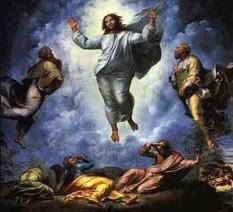Well, this side of resurrected life, the obvious answer is - No. But if not transfigured, we might be transformed. In fact, by all scriptural accounts, those who come to faith in Jesus must be transformed, or converted.
 The Greek word is μετανοια, or metanoia, etymologically related to μεταμορφοω, or metamorphoo. Metamorphosis is, of course, the radical transformation that occurs when a caterpillar forms a chrysalis and then emerges later as a butterfly. The change is striking, to say the least.
The Greek word is μετανοια, or metanoia, etymologically related to μεταμορφοω, or metamorphoo. Metamorphosis is, of course, the radical transformation that occurs when a caterpillar forms a chrysalis and then emerges later as a butterfly. The change is striking, to say the least.
In Romans 12:2, Paul commands us "Do not be conformed to this world, but be transformed...", and then in 2 Cor.5:17 he says "if any one is in Christ, he is a new creation; the old has passed away, behold, the new has come." This obviously means a radical and total change, not just a little reforming job.
The question is: is this transformation something we do, or a miracle of grace? It is, of course, the latter, since none of us has the power to change his own nature. Yet, it is presented as a command as well. If we claim to belong to Jesus, we must avail ourselves of that grace, do what we can to submit to the changes the Holy Spirit wants to accomplish in us. That's a big part of what Lent is to be about.
OK - anybody out there have some hints to help me get started on my cocoon?







